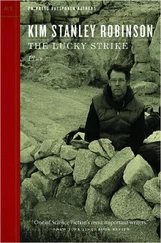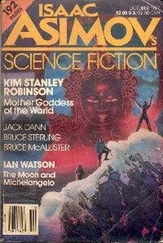At one point Roger must wait for Eileen and Hans to get over the boulder that Frances had such trouble with. His mind wanders and it occurs to him that their chances of success have shifted radically—and with them, the nature of the climb. Low on supplies, facing an unknown route in deteriorating weather—Roger wonders how Eileen will handle it. She has led expeditions before, but this kind only comes about by accident.
She passes him going strong, beats ice from the rope, sweeps spindrift from the top of the boulder. Pulls up and over it in one smooth motion. The wind cuts through Roger as he watches Hans repeat the operation: cuts through the laminated outer suit, the thick bunting inner suit, his skin. . . . He brushes spindrift from his goggles with a frigid hand and heaves up after them.
Though it is spring, the winterlike low-pressure system over Olympus Mons is in place, drawing the wet winds up from the south, creating stable storm conditions on the south and east arcs of the escarpment. The snow is irregular, the wind constant. For the better part of a week the seven climbers left on the face struggle in the miserable conditions. One night at sunset radio hour they hear from Frances and the Sherpas, down at base camp. There is a lot of sand in Martian snow, and their voices are garbled by static, but the message is clear: They are down, they are safe, they are leaving for Alexandria to get Frances’s arm set. Roger catches on Eileen’s averted face an expression of pure relief, and realizes that her silence in the past few days has been a manifestation of worry. Now, looking pleased, she gives the remaining climbers their instructions for the next day in a fresh determined tone.
Into camp at night, cold and almost too tired to walk. Big loaded packs onto the various ledges and niches that serve for this particular camp. Hands shaking with hunger. The camp—Thirteen, Roger believes—is on a saddle between two ridges overlooking a deep, twisted chimney. “Just like the Devil’s Kitchen on Ben Nevis,” Arthur remarks when they get inside the tent. He eats with gusto. Roger shivers and puts his hands two centimeters above the glowing stove ring. Transferring from climbing mode to tent mode is a tricky business, and tonight Roger hasn’t done so well. At this altitude and in these winds, cold has become their most serious opponent. Overmitts off, and everything must be done immediately to get lightly gloved hands protected again as quickly as possible. Even if the rest of one’s body is warmed by exertion, the fingertips will freeze if they have enough contact with cold things. And yet so many camp operations can be done more easily with hands out of mitts. Frostnip is the frequent result, leaving the fingers tender, so that pulling up a rock face, or even buttoning or zipping one’s clothes, becomes a painful task. Frostnip blisters kill the skin, creating black patches that take a week or more to peel away. Now when they sit in the tents around the ruddy light of the stove, observing solemnly the progress of the cooking meal, they see across the pot faces splotched on cheek or nose: black skin peeling away to reveal bright pink new skin beneath.
They climb onto a band of rotten rock, a tuff-and-lava composite that sometimes breaks right off in their hands. It takes Marie and Dougal two full days to find decent belay points for the 150 meters of the band, and every morning the rockfall is frequent and frightening. “It’s a bit like swimming up the thing, isn’t it?” Dougal comments. When they make it to the hard rock above, Eileen orders Dougal and Marie to the bottom of their “ladder” to get some rest. Marie makes no complaint now; each day in the lead is an exhausting exercise, and Marie and Dougal are beat.
Every night Eileen works out plans for the following day, revising them as conditions and the climbers’ strength and health change. The logistics are complicated, and each day the seven climbers shift partners and positions in the climb. Eileen scribbles in her notebook and jabbers on the radio every dusk, altering the schedules and changing her orders with almost every new bit of information she receives from the higher camps. Her method appears chaotic. Marie dubs her the “Mad Mahdi,” and scoffs at the constant changes in plans; but she obeys them, and they work: Every night they are scattered in two or three camps up and down the cliff, with everything that they need to survive the night and get them higher the next day; and every new day they leapfrog up, pulling out the lowest camp, finding a place to establish a new high camp. The bitter winds continue. Everything is difficult. They lose track of camp numbers, and name them only high, middle, and low.
Naturally, three-quarters of everyone’s work is portering. Roger begins to feel that he is surviving the rigors of the weather and altitude better than most of the rest; he can carry more faster, and even though most days end in that state where each step up is ten breaths’ agony, he finds he can take on more the next day. His digestion returns to normal, which is a blessing—a great physical pleasure, in fact. Perhaps improvement in this area masks the effects of altitude, or perhaps the altitude isn’t bothering Roger yet; it is certainly true that high altitude affects people differently, for reasons unconnected with basic strength—in fact, for reasons not yet fully understood.
So Roger becomes the chief porter; Dougal calls him Roger Sherpa, and Arthur calls him Tenzing. The day’s challenge becomes to do all one’s myriad activities as efficiently as possible, without frostnip, excessive discomfort, hunger, thirst, or exhaustion. He hums to himself little snatches of music. His favorite is the eight-note phrase repeated by the basses near the end of the first movement of Beethoven’s Ninth: six notes down, two notes up, over and over and over. And each evening in the sleeping bag, warm, well fed, and prone, is a little victory.
One night he wakes up to darkness and silence, fully awake in an instant, heart pounding. Confused, he thinks he may have dreamed of the Thank God Ledge. But then he notices the silence again and realizes his oxygen bottle has run out. It happens every week or so. He uncouples the bottle from the regulator, finds another bottle in the dark, and clips it into place. When he tells Arthur about it next morning, Arthur laughs. “That happened to me a couple of nights ago. I don’t think anybody could sleep through their oxygen bottle running out—I mean you wake up very awake, don’t you?”
In the hard rock band Roger porters up a pitch that leaves him whistling into his mask: The gullies have disappeared, above is a nearly vertical black wall, and breaking it is one lightning-bolt crack, now marked by a fixed rope with slings attached, making it a sort of rope ladder. Fine for him, but the lead climb! “Must have been Dougal at it again.”
And the next day he is out in the lead himself with Arthur, on a continuation of the same face. Leading is very unlike portering. Suddenly the dogged, repetitious, almost mindless work of carrying loads is replaced by the anxious attentiveness of the lead. Arthur takes the first pitch and finishes it bubbling over with enthusiasm. Only his oxygen mask keeps him from carrying on a long conversation as Roger takes over the lead. Then Roger is up there himself, above the last belay on empty rock, looking for the best way. The lure of the lead returns, the pleasure of the problem solved fills him with energy. Fully back in lead mode, he collaborates with Arthur—who turns out to be an ingenious and resourceful technical climber—on the best storm day yet: five hundred meters of fixed rope, their entire supply, nailed up in one day. They hurry back down to camp and find Eileen and Marie still there, dumping food for the next few days.
Читать дальше
Конец ознакомительного отрывка
Купить книгу












